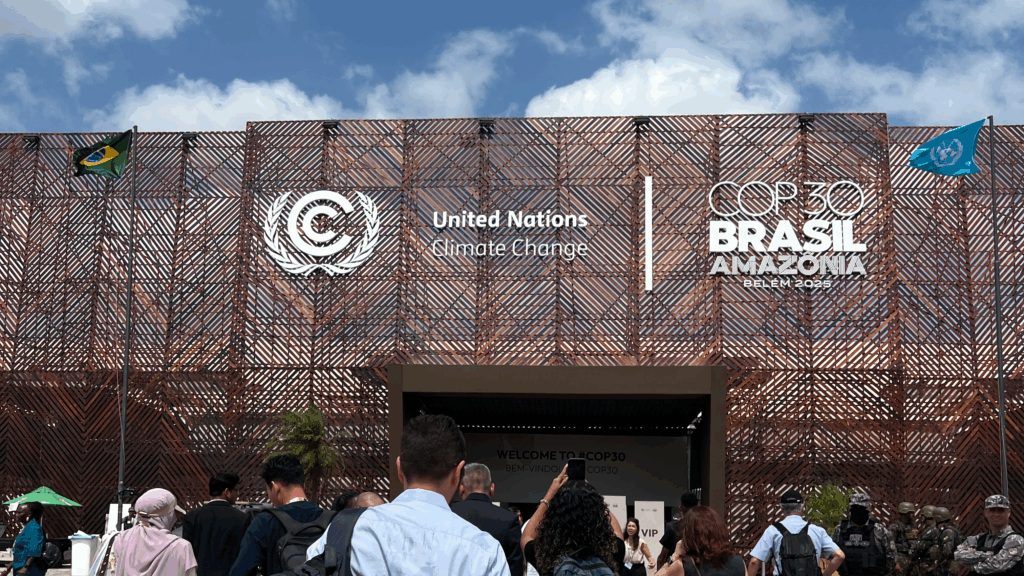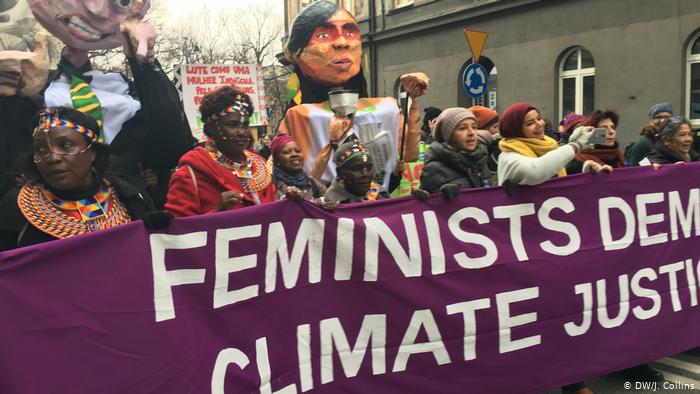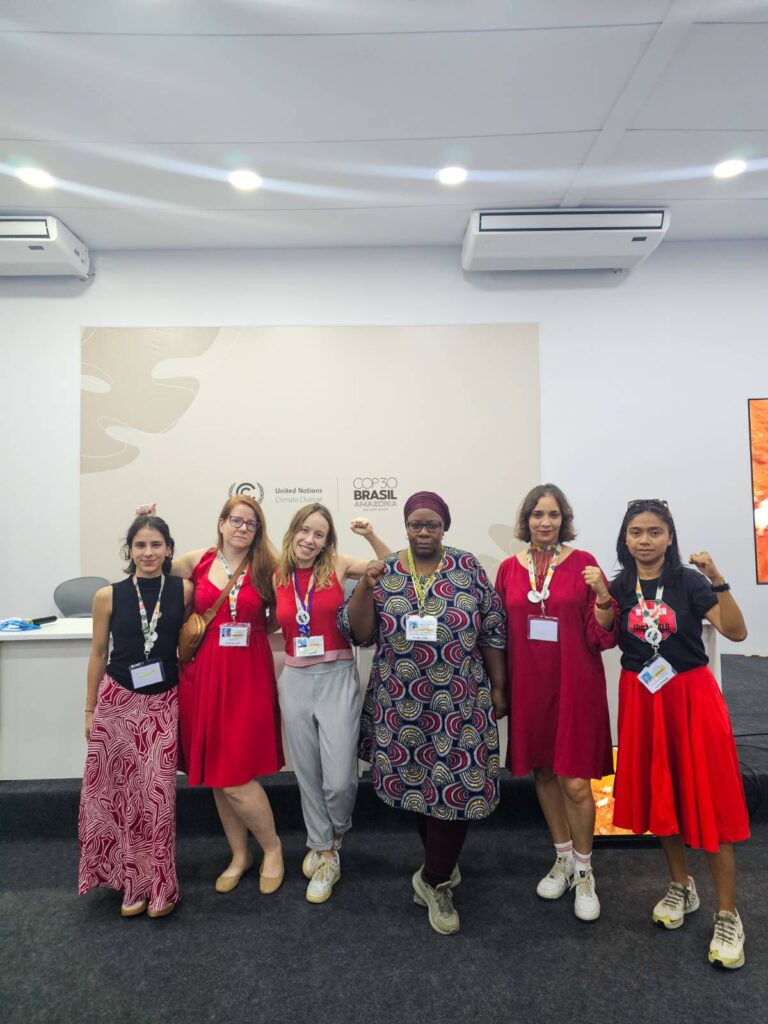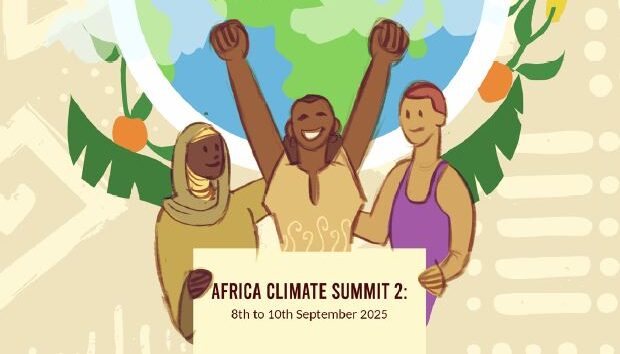
Social Injustice & Climate Chaos: Feminist Response to Cancellation of COP25
“Regardless of where the COP25 will be held, the world will not take its eyes off Chile, or what the people are demanding.”

October 31, 2019 — Yesterday, October 30th, the Government of Chile announced that it would not host the upcoming United Nations Climate Change Summit “COP25” in the country, in view of the social revolution that is underway.
Political Context
On October 19th, the President of Chile, Sebastián Piñera, in agreement with the National Security Council, declared a state of emergency – the first one since Pinochet’s dictatorship – in response to protests against the rising cost of transportation prices in Santiago – a breaking point on top of 30 years of neoliberal policies that affect every aspect of Chilean people’s lives. Chile has the highest level of income inequality amongst the richest countries in the world, and women often bear the brunt of this inequality as they experience massive pay gaps and markedly low levels of employment.
This imposed state of emergency resulted in the severe restriction of peoples’ rights to assembly and freedom of movement. The violence used by police/military forces (“carabineros”) for controlling demonstrations has been excessive. It has been reported that over 3000 arrests have been made throughout the country, that over 1000 people have been injured and at least 18 people have died from the violence. The Instituto de Derechos Humanos (INDH) has confirmed that it was compiling 55 legal cases related to five homicides and eight instances of sexual violence involving both police and military agents, which will be investigated by Chile’s public prosecution service. Other sources suggest wide-spread police violence against women including imposed strip searches, rape threats, and groping with hands and weapons by officers. The United Nations High Commissioner for Human Rights, the former Chilean president Michelle Bachelet, has called for an investigation of allegations of human rights violations and is expected to visit Santiago.
COP25 Suspension
The decision of the Chilean President to forego hosting the APEC and COP25 international summits is not reflective of the demands of national social movements seeking reform. While the state of emergency was lifted on Sunday, October 27, we are deeply alarmed with the tone in the announcement of the President, seeming to place blame for the cancellations on social movements, rather than on the unjust elitist systems that have created vast inequality in the country. We are concerned with the continuous violation and failure of protection of human rights of the people of Chile.
In addition, this decision puts urgent needed climate action at risk just shortly before the Paris Agreement enters its implementation in 2020. We urgently remind leaders around the world that urgent action on climate change and the effective implementation of the Paris Agreement cannot be postponed.
To this end:
- We call on the Government to ensure the protection of human rights and environmental rights defenders, as well as the release of political prisoners, as the country moves forward in dialogues on responding to the demands of local people;
- We call on the Chilean government, and all parties to the UNFCCC and the Paris Agreement, to adopt reforms that put an end to industrial capitalism in its late neoliberal phase, which is the cause of both climate change emergency and inequality;
- We call on Governments to ratify and sign the Escazu Agreement, obliging states to protect the people and groups that defend the environment;
- We call on the global community to recognize and support grassroots groups, organizations, delegations and others still going to Chile to attend and galvanize the “Cumbre de los Pueblos” (People’s Climate Summit);
- And finally, we call on Chile and all countries to not use the postponement of a COP to postpone climate action – we urgently need and demand:
- Ending fossil fuel extraction and investments in fossil fuel infrastructure;
- Ending fossil fuel subsidies without imposing unjust austerity measures onto the people. Fossil fuel companies and governments should incur these costs, and resources should instead be urgently redirected toward the promotion of gender equality, education, social protection and a peaceful and healthy environment;
- Boost the urgently needed integration of ocean issues into all respective bodies and mechanisms under UNFCCC;
- Deliver upscaled, ambitious, fast-tracked and gender-transformative finance delivered overwhelmingly as grants to ensure climate frontline communities and the poorest countries and people are able to better respond and adapt to the urgent and slow-onset realities of the climate crisis, as well as to address irrevocable loss and damage;
- Ensure a rights-based and people-centered global framework for action on climate change that works towards a just transition for all.
Social Justice & Climate Chaos
Throughout this, the people of Chile have continuously and courageously taken to the streets, the vast majority in peaceful demonstrations, to demand Constitutional reform, the resignation of President Sebastian Piñera, to challenge the use of military force, and to demand an end to systems that currently privileges an elite few off the backs of the Chilean people.
As feminists from around the world, we have watched as people’s movements are mobilized in the ‘birthplace of Neo-liberalism’ to challenge the very conditions which we know are fundamental drivers of the climate crisis – a white-supremacist hetero-patriarchal system that prioritizes profit over people and elites over majority, that privatizes critical public goods, and that upholds a model of resource extraction, environmental exploitation and militarization.
Women and feminists have been on the frontlines of the protests in Chile, as they are on the frontlines of the climate justice movement. Organizing local assemblies that have focused on care work including child care, support for the elderly and providing food have been central feminist aspects of the movement.
The social revolution in Chile mirrors the demands and mobilizations of social, economic and ecological justice and feminist movements around the world – reverberating loudly in their demands for basic human rights, for bodily autonomy, for access to water, food, education and universal healthcare, to dignified and decent work, and to a peaceful, healthy, safe, and sustainable environment. The pillars of ‘market-driven development’ are being torn down as the reality of growing global social inequality and injustice, and a relentlessly progressing climate emergency are at our doorsteps.
For decades, women’s rights and feminist movements have brought forward an analysis to shift to a more peaceful and just world, demanding a revolution that would deliver people from our interlocking systems of capitalism, resource extraction, labor exploitation, racism, colonization, the commodification of nature, imperialism, hegemony and militarism. We remain steadfast in this work and stand in full solidarity with the feminists, women, the youth and students, Indigenous people, LGBTQI++ persons, human rights advocates and environmental rights defenders in Chile!
Regardless of where the COP25 will be held, the world will not take its eyes off Chile, or what the people are demanding. These demands echo around the world. Neoliberalism has lead us to this climate emergency, and people around the world are uniting and rising up against this urgent crisis.
Initiated by the Women and Gender Constituency of the UNFCCC
——————-
„Independientemente de dónde tendrá lugar la COP25, el mundo no apartará su vista de Chile, ni de lo que el pueblo está exigiendo.“
31 de octubre, 2019 – Ayer, 30 de octubre, el Gobierno de Chile anunció que no será sede de la próxima Cumbre de las Naciones Unidas sobre el Cambio Climático “COP25”, a causa de la revolución social que está en marcha.
Contexto político
El 19 de octubre, el Presidente de Chile, Sebastián Piñera, en acuerdo con el Consejo de Seguridad Nacional, declaró el estado de emergencia -el primero desde la dictadura de Pinochet- en respuesta a las protestas contra el aumento de los precios del transporte en Santiago, un punto de inflexión en los 30 años de políticas neoliberales que afectan a todos los aspectos de la vida de lxs chilenxs. Chile tiene el nivel más alto de desigualdad de ingresos entre los países más ricos del mundo, y las mujeres a menudo son las más afectadas por esta desigualdad, ya que experimentan enormes brechas salariales y marcados bajos niveles de empleo.
Este estado de emergencia impuesto dio lugar a una grave restricción de los derechos de reunión y de la libertad de circulación de las personas. La violencia utilizada por las fuerzas policiales y militares (“carabineros”) para controlar las manifestaciones ha sido excesiva. Se han reportado más de 3.000 detenciones en todo el país, más de 1.000 personas han resultado heridas y al menos 18 han muerto a causa de la violencia. El Instituto de Derechos Humanos INDH confirmó su recopilación de 55 casos judiciales relacionados con cinco homicidios y ocho casos de violencia sexual en los que participaron agentes policiales y militares, que serán investigados por la Fiscalía General de la Nación. Otras fuentes sugieren que la violencia policial contra las mujeres está muy extendida, incluyendo registros corporales al desnudo, amenazas de violación y manoseo y toqueteo con armas por parte de los agentes de policía. La Alta Comisionada de las Naciones Unidas para los Derechos Humanos, la ex presidenta chilena Michelle Bachelet, ha pedido una investigación por las denuncias de violaciones de derechos humanos y se espera que visite Santiago.
Suspensión de COP25
La decisión del Presidente de Chile de no ser anfitrión de las cumbres internacionales de APEC y COP25 no refleja las demandas de los movimientos sociales nacionales que buscan reformas. Si bien el estado de emergencia se levantó el domingo 27 de octubre, estamos profundamente alarmadxs por el tono del anuncio del Presidente, que parece culpar a los movimientos sociales por las cancelaciones, en vez de los injustos sistemas elitistas que han creado una gran desigualdad en el país. Nos preocupa la continua violación y el fracaso de la protección de los derechos humanos del pueblo de Chile.
Además, esta decisión pone en peligro las urgentes medidas climáticas necesarias justo antes de que el Acuerdo de París entre en vigor en 2020. Recordamos con urgencia a los dirigentes de todo el mundo que no se puede posponer la adopción de medidas drásticas sobre el cambio climático y la aplicación efectiva del Acuerdo de París.
Con este fin:
- Pedimos al Gobierno que garantice la protección de lxs defensorxs de los derechos humanos y del medio ambiente, así como la liberación de lxs presxs políticxs, a medida que el país avanza en los diálogos para responder a las demandas de la población local;
- Hacemos un llamado al gobierno chileno, y a todas las partes de la CMNUCC y del Acuerdo de París, para que adopten reformas que pongan fin al capitalismo industrial en su fase neoliberal tardía, que es la causa tanto de la emergencia del cambio climático como de la desigualdad socioeconómica;
- Pedimos a los gobiernos que ratifiquen y firmen el Acuerdo de Escazú, que obliga a los Estados a proteger a las personas y grupos que defienden el medio ambiente;
- Hacemos un llamado a la comunidad internacional para que reconozca y apoye a los grupos de base, organizaciones, delegaciones y otrxs que aún viajarán a Chile para asistir y dinamizar la “Cumbre de los Pueblos” (People’s Climate Summit);
- Y finalmente, hacemos un llamado a Chile y a todos los países para que no utilicen el aplazamiento de una COP para posponer la acción climática. Necesitamos y exigimos con urgencia:
- Poner fin a la extracción de combustibles fósiles y a las inversiones en infraestructura de combustibles fósiles;
- Poner fin a los subsidios a los combustibles fósiles sin imponer medidas de austeridad injustas a la población. Las compañías de combustibles fósiles y los gobiernos deberían incurrir en estos costos, y los recursos deberían ser reorientados urgentemente hacia la promoción de la igualdad de género, la educación, la protección social y un medio ambiente pacífico y saludable;
- Impulsar urgentemente la integración necesaria de las cuestiones oceánicas en todos los órganos y mecanismos respectivos de la CMCCNU;
- Entregar financiación ampliada, ambiciosa, acelerada y transformadora de género, en su inmensa mayoría en forma de subsidios, para asegurar que las comunidades enfrentando mas fuertemente el cambio climático así como los países y personas más pobres puedan responder mejor y adaptarse a las realidades urgentes y iniciantes de la crisis climática, así como para abordar las pérdidas y los daños irrevocables;
- Asegurar un marco de acción global basado en los derechos y centrado en las personas para la acción sobre el cambio climático que trabaje hacia una transición justa para todxs.
Justicia social y caos climático
A lo largo de todo esto, el pueblo de Chile ha salido a las calles de manera continua y valiente, la gran mayoría en manifestaciones pacíficas, para exigir la reforma constitucional, la renuncia del Presidente Sebastián Piñera, para desafiar del uso excesivo de la fuerza militar, y para exigir el fin de los sistemas que actualmente privilegian a una élite sobre las espaldas del pueblo chileno.
Como feministas de todo el mundo, hemos visto cómo los movimientos populares se movilizan en la “cuna del neoliberalismo” para desafiar las mismas condiciones que sabemos que son los motores fundamentales de la crisis climática: un sistema heteropatriarcal supremacista blanco que prioriza las ganancias sobre las personas y las élites sobre la mayoría, que privatiza los bienes públicos y que defiende un modelo de extracción de recursos, explotación ambiental y militarización.
Las mujeres y las feministas han estado en la primera línea de las protestas en Chile, así como en las primeras líneas del movimiento de justicia climática. La organización de asambleas locales que se han centrado en el trabajo de cuidado, incluyendo el cuidado de lxs niñxs, el apoyo a las personas mayores y la provisión de alimentos, han sido aspectos centrales del movimiento feminista.
La revolución social en Chile refleja las demandas y movilizaciones de la justicia social, económica y ecológica y de los movimientos feministas de todo el mundo, reverberando fuertemente en sus demandas por los derechos humanos básicos, por la autonomía corporal, por el acceso al agua, la alimentación, la educación y la salud universal, por un trabajo digno y decente, y por un medio ambiente pacífico, saludable, seguro y sostenible. Los pilares del “desarrollo impulsado por el mercado” están siendo derribados a medida que la realidad de la creciente desigualdad social mundial y la injusticia, y una implacable emergencia climática progresista se cierne sobre nuestras puertas.
Durante décadas, los movimiento de derechos de la mujer y feministas han presentado un análisis para cambiar hacia un mundo más pacífico y justo, exigiendo una revolución que libere a la gente de nuestros sistemas interconectados entre capitalismo, extracción de recursos, explotación laboral, racismo, colonización, mercantilización de la naturaleza, imperialismo, hegemonía y militarismo. Nos mantenemos firmes en este trabajo y nos mantenemos en plena solidaridad con las feministas, las mujeres, lxs jóvenes y estudiantes, lxs indígenas, las personas LGBTQI++, lxs defensorxs de los derechxs humanxs y lxs defensorxs de los derechos del medio ambiente en Chile!
Independientemente de dónde se celebre la COP25, el mundo no quitará los ojos de encima de Chile, o de lo que la gente está exigiendo. Estas demandas se hacen eco en todo el mundo. El neoliberalismo nos ha llevado a esta emergencia climática, y personas de todo el mundo se están uniendo y levantando contra esta crisis urgente.
Signatures – Sign on here
Organizations/ Networks
350.org
ACT IT Network – Fiji
ActionAid – Global
Actions Vitales pour le Developpement Durable- Cameroon
Action for Improvement of Food Child and Mother ( AFICM)- Democratic Republic of the Congo
Adéquations – France
Afrihealth Optonet Association [CSOs Network]- Nigeria
Alliance for Future Generations – Fiji
Alliance for a Clean Environment (Australia)
Asabe Shehu Yar’adua Foundation (ASYARFS) – Nigeria/ United States
Asia Development Alliance – India
Asian-Pacific Resource and Research Centre for Women (ARROW)- Malaysia
Association des Femmes de l’Europe Méridionale- France
Asociación Ciudadana por los Derechos Humanos- Argentina
Association De Lutte Contre Les Violences Faites Aux Femmes Et Aux Filles Extreme Nord Cameroun- Cameroun
Association pour la Conservation et la Protection des Ecosystèmes des Lacs et l’Agriculture Durable – DRC
Association for Dalit Woman Advancement of Nepal- Nepal
Aube Nouvelle pour la Femme et le Développement (ANFD)- DR.Congo
Australian Centre for Culture, Environment, Society and Space- Australia
Bangladesh Model Youth Parliament (Protiki Jubo Sangsad)- Bangladesh
Business Innovation Research Development – France
Caribbean Women’s Network – Jamaica
Center for Earth Ethics- USA
Center for Women’s Global Leadership – USA
CHIRAPAQ, Centro de Culturas Indígenas del Perú
Civicus -DIGNA- Fiji
Climate Emergency Institute- Canada
Climate Watch Thailand- Thailand
Comité de América Latina y el Caribe para la Defensa de los Derechos de las Mujeres, CLADEM- Regional
Community Church of New York- USA
Continental Network of Indigenous Women is the Americans- United States
Corporate Accountability
CPER Trus- India
CRACIA- United States
DIVA for Equality- Fiji
Dr Uzo Adirieje Foundation (DUZAFOUND)- Nigeria
Dukingire Isi Yacu-Burundi for Resillience – Burundi
Eglise du Christ au Congo/Bureau d’Architecture Technologies Appropriees et Infrastructures Rurales(ECC/BATIR)- Republique Democratique du Congo
ELFA- Fiji
Enlaces por la Sustentabilidad – El Salvador
Equality Bahamas- The Bahamas
ETC Group – Global
Feminist League- Kazakhstan
Feminist Task Force- Global
Femmes et enfants an detresse- Niger
femLINKpacific- Fiji
Fiji Youth SRHR Alliance – Fiji
FRIDA The Young Feminist Fund
Free the Marginalized Women Advocates (FREMWA)- Ghana
Free Trade Union Development Center- Sri Lanka
Freshwater Action Network Mexico- Mexico
Fridays for Future, 350 Brooklyn Families- United States
Fundacion Guatemala- Guatemala
Fundaciónpara Estudio e Investigación la Mujer – Argentina
Gatef- Egypt
Gender Center- Republic of Moldova
GenderCC- Women for Climate Justice – Germany / South Africa
Gender and Development Initiative (Gendi)- India
Global Purpose Project- USA
GPPAC – Global Partnership for the Prevention of Armed Conflict – Fiji
Green Women- Sweden
Haus of Khameleon – Fiji
Helami Enterprises – Kenya
Hope Advocates Africa- Cameroon
Humanitaire Plus- Togo
IASSW International Association of Schools of Social Work- Italy
Indigenous Climate Action – Canada
Initiative de la Société civile pour les ODD- Côte d’ Ivoire
INOCHI / Women for Safe Energy – United States
Interamerican Net women shelters- México
International Roma Women Organization – Republic of Moldova
International Women’s Development Agency (IWDA)- Australia
INWES- France
Italian Climate Network- Italy
Just Associates (JASS)- USA
Joint Centre for Disaster Research- New Zealand
Kathak Academy(KA)- Bangladesh
Kenya Agribusiness and Agroindustry Alliance- Kenya
Kikandwa Environmental Association (KEA) – Uganda
L’ Associacio. Drets Sexuals i Reproductius – Spain
Landesa- US
Lead Tchad- Chad
LIFE- Education Environment Equality e.V.- Germany
MADRE – Global / USA
Mayama ac – Mexico
Medical IMPACT- Global
MenEngage Alliance – United States
Millennia2025 Women and Innovation Foundation – International, based in Wallonia, Belgium
Na i SoqoSoqo Vakamarama i Taukei- Fiji
National Association of Professional Environmentalists (NAPE) – Uganda
National Coalition of Civil Society Organizations of Liberia- Liberia
National Association for Women’s Action in Development- Uganda
Osi Joe Touching Lives Initiative – Nigeria
PACEP – Kenya
Pacific Partnerships on Gender, Climate Change & Sustainable Development (PPGCCSD)Pacific SIDs Coalition
Pacific Conference of Churches – Fiji
Pari o Dispare- Italy
Potere al Popolo – Italy
Radanar Ayar Association- Myanmar (Burma)
Rainbow Pride Foundation- Fiji
Rapad Maroc- Morocco
Red Dot Foundation- India
REPEM, SEDRA- Chile
Rural Women Initiative- Kenya
S.M.R.C- India
Servicios Ecumenicos para Reconciliacion y Reconstruccion- SERR- El Salvador
Sisters of Charity Federation- United States
Solidaritas Perempuan (Women Solidarity for Human Rights)- Indonesia
Somali Youth Development Foundation (SYDF)- Somalia
Society for Conservation and Sustainability of Energy and Environment in Nigeria (SOCSEEN)- Nigeria
Success Capital Organisation- Botswana
Sukaar Welfare Organization- Pakistan
Support for Women in Agriculture and Environment- Uganda
Sustaining All Life- United States
Temple of Understanding- USA
The Beam Magazine- Germany
The ISET of Djerba- Tunisia
Transdiaspora Network – USA
UBINIG (Policy Research for- Development Alternative)- Bangladesh
Union de l’Action FéministeMaroc
Unitarian Universalist United Nations Office- United States
United for a Purpose Brigade- Seychelles
US Human Rights Network- United States
Water.org- United States
Women’s International League for Peace and Freedom (WILPF) – United Kingdom/ Italy
Women Advocates Research and Documentation Center (WARDC)- Nigeria ADVOCATES
Women Asso- Turkey
Women Engage for a Common Future- The Netherlands
Women’s Earth and Climate Action Network (WECAN) International- United States
Women’s Environment and Development Organization – United States
Women’s Initiatives Supporting Group WISG- Georgia
Women’s March Global – Switzerland
Women’s Major Group – Global
Youth Action Hub Guinea – CNUCED – Guinée
YouAct – European Youth Network on Sexual and Reproductive Rights- Georgia
Zimbabwe United Nations Association – Zimbabwe
Individuals
Julie Gorecki, Feminist and Climate Justice Scholar and Activist
Margaux Granat, Climate Justice and Equity Advisor, United States
Kodjo M APPOM, Executive Director, Togo
Maria Nailevu, Feminist and Climate Activist, Fiji
Diane Husic, Dean, School of Natural and Health Sciences, Moravian College, USA
Sebastian Guzman, Visiting Assistant Professor, Purchase College, SUNY, United States
Irene Hong Ping Shen, Social, Economic and Climate Justice Activist
Christina Catalano, Civil Rights Activist Founder and Chairman of The RISE Anti-Bullying Initiative
Lynda Tabuya, Opposition Whip, Parliament of Fiji
Giuseppe Bruzzone, Pacifist- Climate Actvist, Italy
Anna Valente, Activist, Italy
Lillian Sol Cueva, Feminist Activist and Scholar, Mexico
Rosa de Nooijer, Feminist and Food Politics Scholar, The Netherlands
Paolo Lega, Socio Circolo Legambiente di Piacenza, Italia
Silvia Galliano, Italia
Dawn Learning, Human Rights Representative, Canadian Union of Public Employees, Canada

